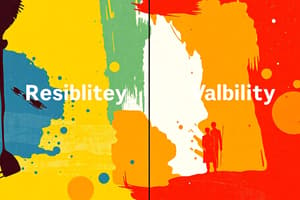Podcast
Questions and Answers
What does validity refer to?
What does validity refer to?
- The degree to which a test measures what it is intended to measure (correct)
- The ease of understanding the test instructions
- The uniformity of test results across different populations
- The ability of a test to predict future performance
Which of the following is NOT a type of validity?
Which of the following is NOT a type of validity?
- Criterion Validity
- Statistical Validity (correct)
- Content Validity
- Face Validity
What is Face Validity?
What is Face Validity?
The extent to which a measure appears to assess the construct of interest superficially.
How does one assess Content Validity?
How does one assess Content Validity?
What is Criterion Validity?
What is Criterion Validity?
A high Content Validity Ratio (CVR) indicates that more than half of the raters agree that the item is ______.
A high Content Validity Ratio (CVR) indicates that more than half of the raters agree that the item is ______.
What does Incremental Validity measure?
What does Incremental Validity measure?
What is a Construct?
What is a Construct?
What does Convergent Validity assess?
What does Convergent Validity assess?
Flashcards are hidden until you start studying
Study Notes
Validity
- Validity measures how well a test measures its intended target in a specific context.
- There is no universal validity; tests can be valid only for specific uses and populations.
- High validity coefficients generally correlate with acceptable reliability coefficients.
Types of Validity
- Face Validity
- Content Validity
- Criterion Validity
- Construct Validity
Face Validity
- Evaluates whether a measure superficially appears to reflect the intended construct.
- It is not based on established theories; relies on a cursory review.
Content Validity
- Assesses the alignment of a measure with the theoretical domain of a construct.
- Important for specific abilities; less useful for broad psychological constructs.
- Example: A math test lacking addition questions would not exhibit high content validity.
Quantifying Content Validity
- Lawshe's method involves raters assessing the relevance of each item as essential, useful, or unnecessary.
- The Content Validity Ratio (CVR) quantifies the agreement among raters; positive CVR indicates majority agreement.
Criterion Validity
- Measures the correlation of an instrument with specific outcome criteria.
- Includes two forms:
- Concurrent Validity: Correlation with another measure at the same time (e.g., essay vs. multiple-choice tests).
- Predictive Validity: Correlation with future performance (e.g., SAT predicting GPA).
Validity Coefficient
- Indicates the correlation between a test score and the criterion score.
- Methods include simple regression and multiple regression for assessing incremental validity.
Incremental Validity
- Refers to the additional explanation provided by new predictors beyond existing ones.
- Example: Assessing if adding study hours improves the predictive power of SAT scores on GPA.
Construct
- Constructs are unobservable concepts used to explain behaviors (e.g., self-esteem, depression).
- Construct Validity measures how effectively a test assesses a psychological construct, distinct from established abilities.
Evidence of Construct Validity
- Tests demonstrate homogeneity and consistent measurement of a single construct.
- Scores should vary predictably with age, time, or experimental changes (e.g., effects of antidepressants).
- Top-down theoretical predictions can be validated through score variation among distinct groups.
Convergent and Divergent Validity
- Convergent Validity assesses how well the test relates to other related measures (e.g., IQ and achievement).
- Discriminant Validity examines the lack of correlation with unrelated constructs, ensuring distinct measure characteristics.
Studying That Suits You
Use AI to generate personalized quizzes and flashcards to suit your learning preferences.




